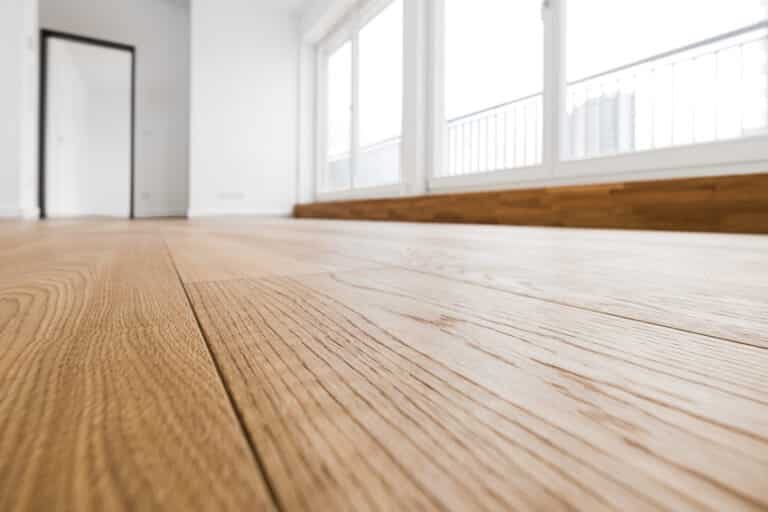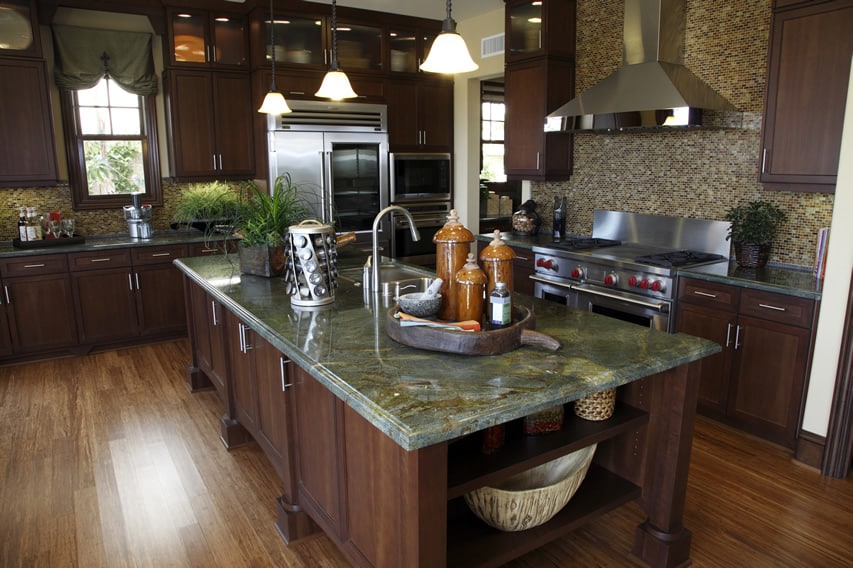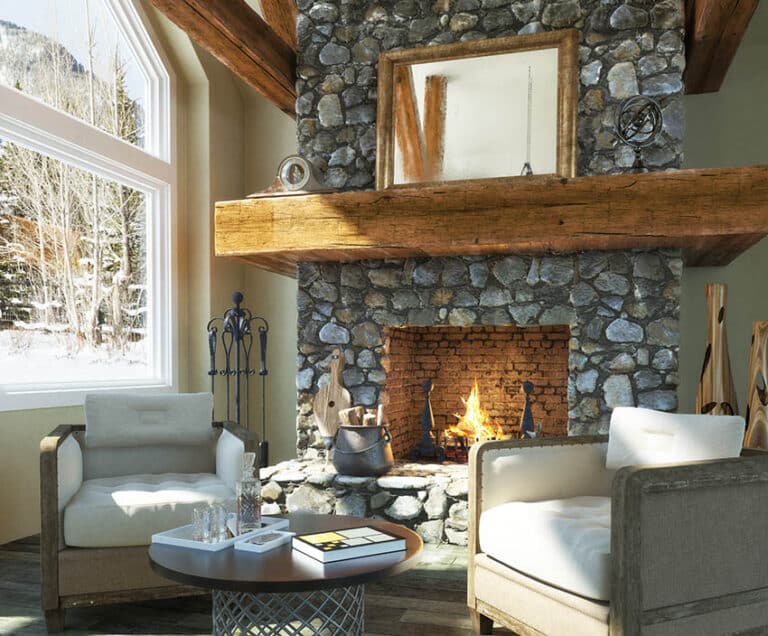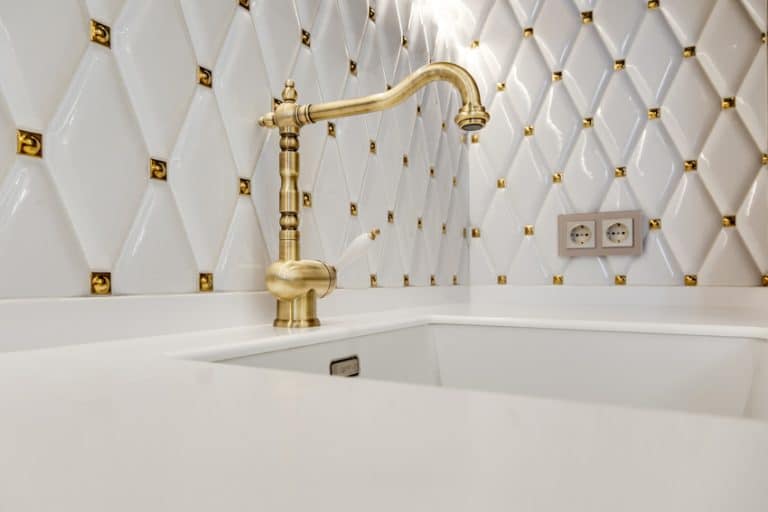Cork Flooring Pros And Cons
See the cork flooring pros and cons including its durability, maintenance, if it’s waterproof or slippery, design tips, and if cork floors can be used in a bathroom.
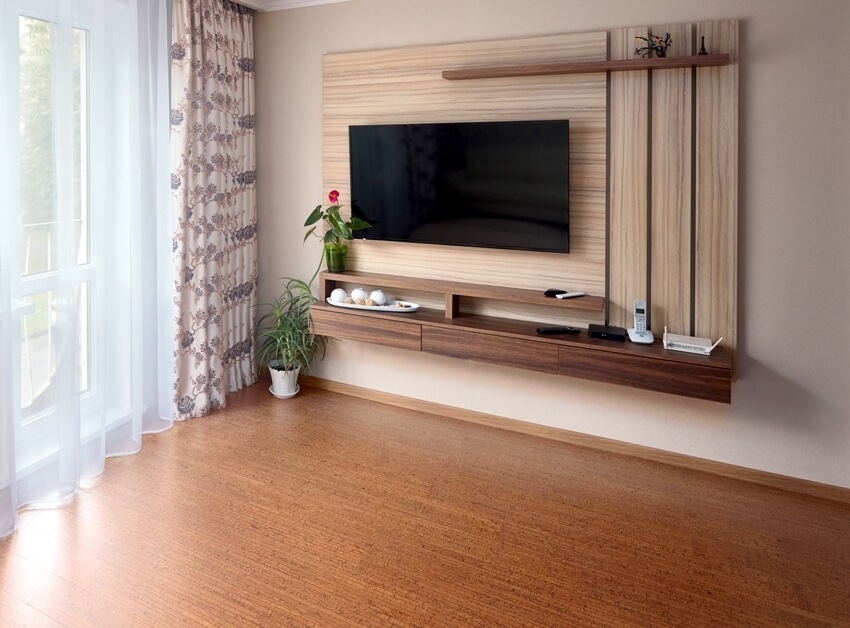
Lately, cork flooring has been coming back because of the heightened awareness for using renewable materials in the home. It is considered a renewable and “green” resource. Cork is biodegradable, and you can use it in your home instead of opting for some of the more harmful flooring products out there.
What Are Cork Floors?
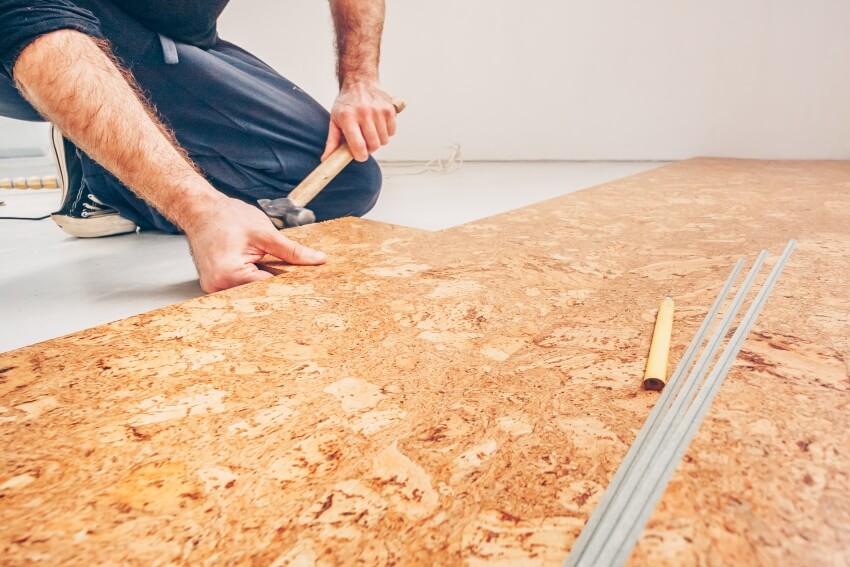

Upload a photo and get instant before-and-after room designs.
No design experience needed — join 2.39 million+ happy users.
👉 Try the AI design tool now
This is almost always for commercial purposes. What this means is that by and large, cork is a highly renewable and sustainable material.
In order to manufacture it into the cork that we’re familiar with, the raw material is ground up into course pieces, mixed in with resins and other similar materials and binding agents, and then eventually compressed into sheets. Innovations in technology have produced cork tiles, cork planks, and so much more.
They can be made into literally anything and that’s part of its beauty and versatility. It’s a simple enough manufacturing process and doesn’t leave a substantial carbon footprint in the environment as well.
Cork floors are highly merited. These days, you can see them almost everywhere, from the home, and even in commercial uses. Cork installation is almost ubiquitous in homes and offices these days.
However, cork does have its downsides as well. They may not always be the most durable of materials because of the fact that they’re so biodegradable. There are things that can be done to offset this, from using multiple layers of sealer, and so on.
Pros Of Cork Flooring
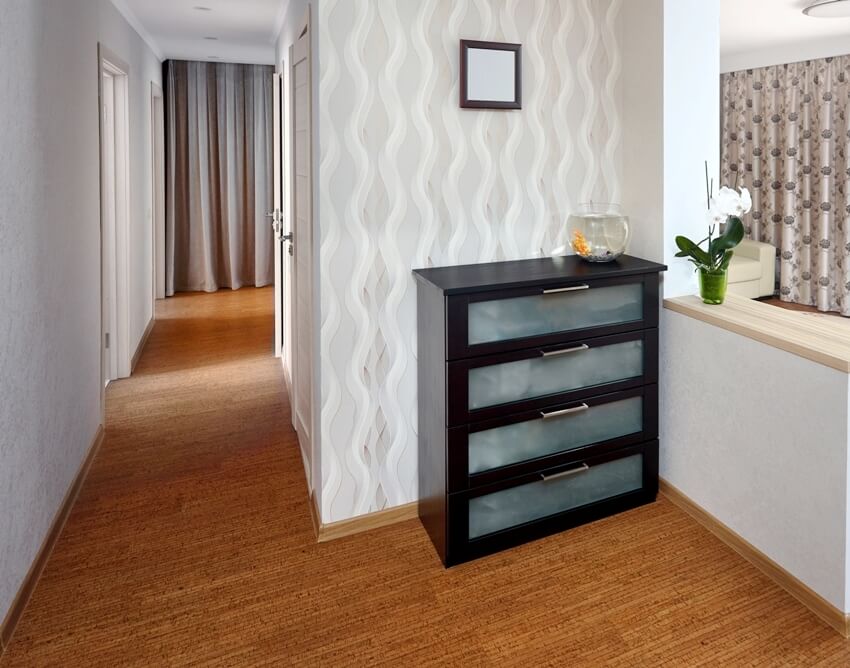
What this means is that this can help you lower your energy bills at home especially during the particularly cold or hot months where you rely on electric heating or cooling to manage indoor temperature. Cork is a material that boasts of natural thermal properties. They contain a 3.0 R-value per inch of thickness.
This translates to the approximate warmth delivered by mid-weight puffy jackets just from the material alone. If you have cork floors, it may no longer be necessary for you to get expensive radiant floor heating systems at all.
Easy to DIY and install!
This applies to engineered cork wood planks in particular. Most of them come with grooves that are designed for a click-and-lock type of installation and are rivaled only by vinyl sheets and laminates when it comes to how easy it is to get them installed.
They essentially provide you with what’s known as a “floating floor”. You can have them installed on top of any existing flooring material such as different types of tiles, hardwood, and the like. This comes as no surprise why DIYers love them so much!
It’s friendly to the environment!
Cork oak wood is a material that grows pretty fast. But more than that, it benefits a lot from fast and repeated harvesting because the main tree is never really cut down. Only cuttings are harvested and after some time, the living trees regrow the branches they’ve lost.
This makes it extra sustainable and this provides very fast turnaround times. Hardwood trees, on the other hand, can take decades to grow!
Cork offers acoustical benefits at home.
Cork is a material that has acoustic properties capable of dampening the sounds once installed indoors. This means that you never have to worry too much or get too distracted with the clickety-clackety sound of heels and other shoes walking when people are walking around in the house.
This makes cork floors perfect for bedrooms, dance studios, music studios, playrooms, gyms, and so on and so forth. If you’re ever facing a conundrum and are stuck on which flooring option to pick out because there are so many, cork floors are a guaranteed middle ground!
Cork is easier on the joints.
Cork floors are spongy in quality. This means that they can be quite kind to your joints and overall, to your body. It’s springy but at the same time, also quite firm. This can serve as additional support and can be great for the people living in the house who may be experiencing joint and back pains.
If you happen to be spending a lot of time on your feet, cork floors are great to have around. These floors are also pretty great and are actually highly recommended for the elderly, the disabled, and those who may be prone to injuries. They’re very comfortable to have in the home.
Cork floors are fire retardant.
This is due to a natural wax-like substance called Suberin. The cork oak tree is named Quercus Suber, specifically because of the fact that there’s a lot of Suberin found inside the cork material. This doesn’t mean that cork will never burn though.
In the spirit of full disclosure, it still will. However, what you can be rest assured of is that it will never produce or catch any flames. This is thanks to the Suberin. Hence, this makes your floors very fire retardant.

This is also because of the Suberin. On top of being a fire retardant, it is also anti-microbial and highly hypoallergenic. Some common things that attack the structural integrity of common flooring materials are pests, such as termites and dust mites, mold, and even mildew.
This isn’t an issue with cork flooring. Cork is also a great floor to have if you have people in your household who are prone to allergies because it can provide comfort without aggravating any allergic or respiratory symptoms.
It can get refinished.
Cork flooring can be refinished in almost the same way as hardwood floors can. All that’s really needed to be done is to get it sanded down, re-stained, layer on a top coat of varnish; and you’re done.
It’s that easy and you wouldn’t even need to hire out a professional to get it done. You can pretty much do it yourself.
Cork floors and the cork material in general come with naturally busy patterns because they were ground up and then compacted together. This means that any issues of scratches, etches, or scuffs on the floors can be either easily hidden or repaired with little to no issues at all.
When buying your cork through, make sure that it’s coming from a known and reputable manufacturer. Other flooring materials have grades in the quality that they come in and cork isn’t any different.
Cons Of Cork Flooring
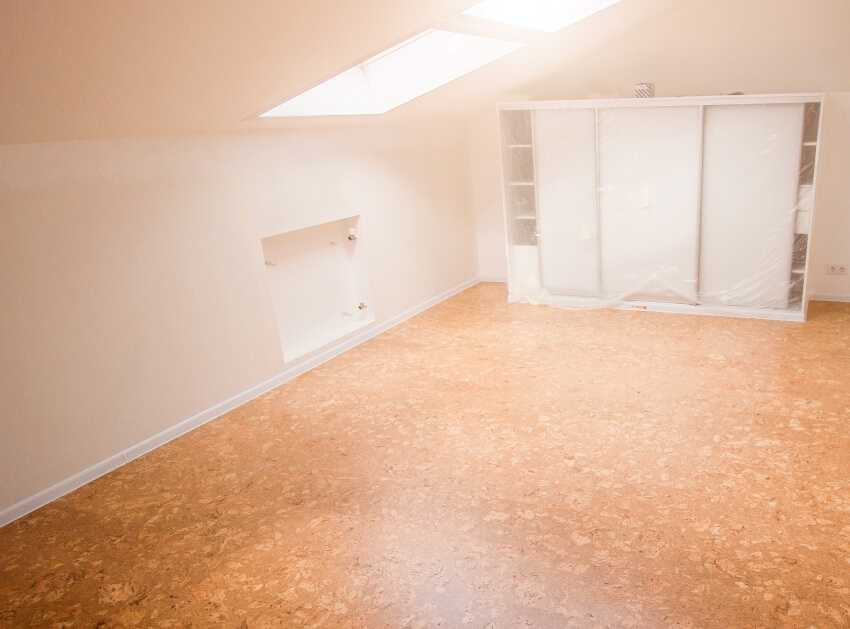
Long term natural light exposure can eventually lead cork floors to turn yellowish or fade out. This can also be damaged by any indoor UV lamps in and around the house.
Cleaning the floors with cleaning products may have the same effect so you need to be careful with how you handle your cork floors especially if you want them to have a preserved or extended life span. Corks aren’t the best floor materials for sunrooms, kitchens, greenhouses, or any location that may be exposed to a lot of UV light.
It doesn’t deal well with humidity.
Cork floors are comprised of wood grains that expand and shrink when the humidity fluctuates indoors. Summers and winters can leave your floors soaked with moisture.
However, this doesn’t have to take you away from the advantages of having cork floors. You can counter this with a dehumidifier or an HVAC system that’s equipped with one.
It can absorb water.
This means that any spillages and liquids and the like will easily get absorbed by your cork floors. You can counter this with proper sealing but it’s still an occasional hazard.
Like wood flooring, cork does not handle wet environments well. For more options see our wood flooring alternatives article here.
Can be easily damaged by blunt and sharp objects alike.
Sharp and blunt objects alike can easily cause surface damage on your cork floors. The damage can be permanent. You would need to cut the damaged part out and replace it with a new cork plank patch.
It requires regular sealing and maintenance.
They need to be resealed annually. When varnish or sealer gets worn out, this can leave your cork floors susceptible to water spills and damage. And without proper maintenance, the material may easily crumble.
Damp mopping, wet rags, and regular vacuuming and sweeping may also cause eventual damage to your cork floors.
Staining can be an issue.
Cork floors have a lot of variances in their surface texture. You need to make sure that they come pre-stained before the actual installation. Thankfully, you can actually opt to get cork plank that are already stained.
How Long Does A Cork Floor Last?
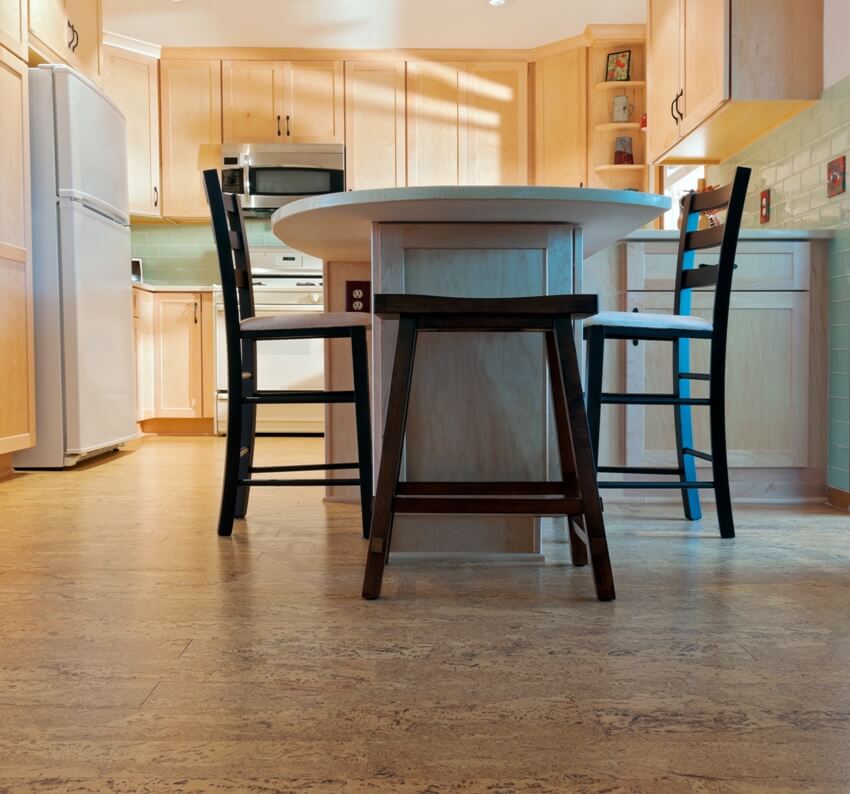
Cork floors also have unmatched durability because they’re easy to replace and refinish so that’s another thing for you to look forward to.
Is Cork Flooring Waterproof
Cork is a material that has natural waxes that can repel liquids especially when paired with varnishes and sealers periodically. So technically speaking, they aren’t waterproof but with the proper treatments, they can be made water resistant.
Is Cork Flooring Slippery?
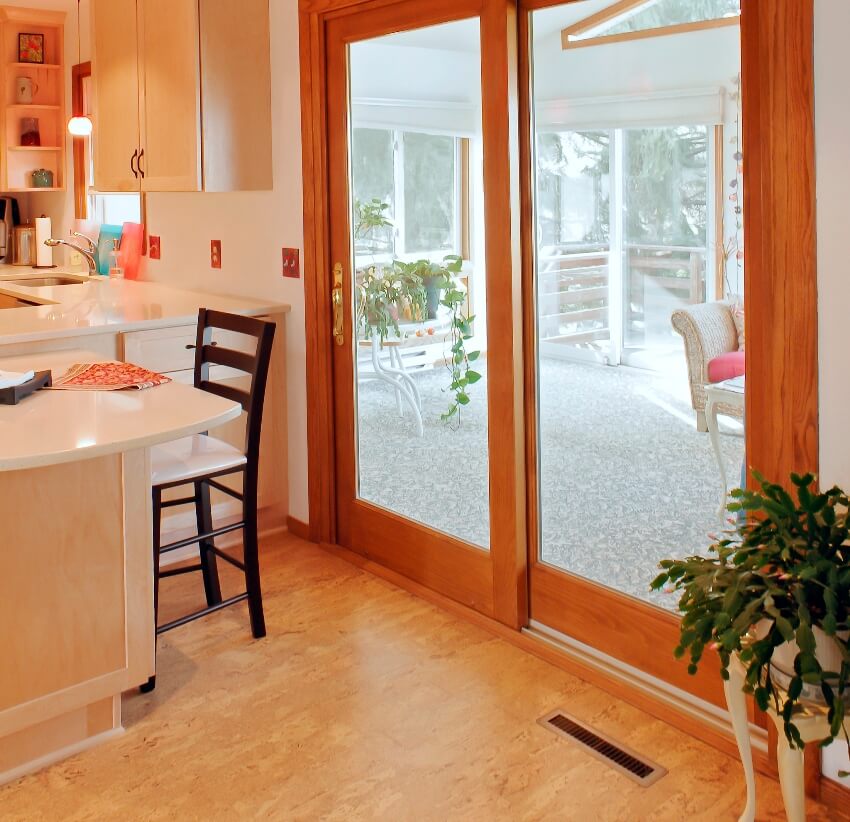
They’re definitely less slippery compared to their more textured flooring counterparts, making them far safer for you to walk on. This can be great for the elderly or for people with disabilities.
Can You Use Cork Flooring In A Bathroom?
Understandably, cork floors aren’t waterproof. However, with the proper treatments, they can be made water-resistant and this makes them viable for you to use in the bathroom. What’s recommended is that you coat it with a polyurethane topcoat.
This will protect your cork floors further from any spillages. It would be best if you also go ahead and get it protected further with a non slip mat or some type of bathroom rug near the areas that typically get a lot of water such as near the shower, the bath tub, or the sink. Find out how to waterproof wood flooring for bathrooms here.
Are Cork Floors High Maintenance?
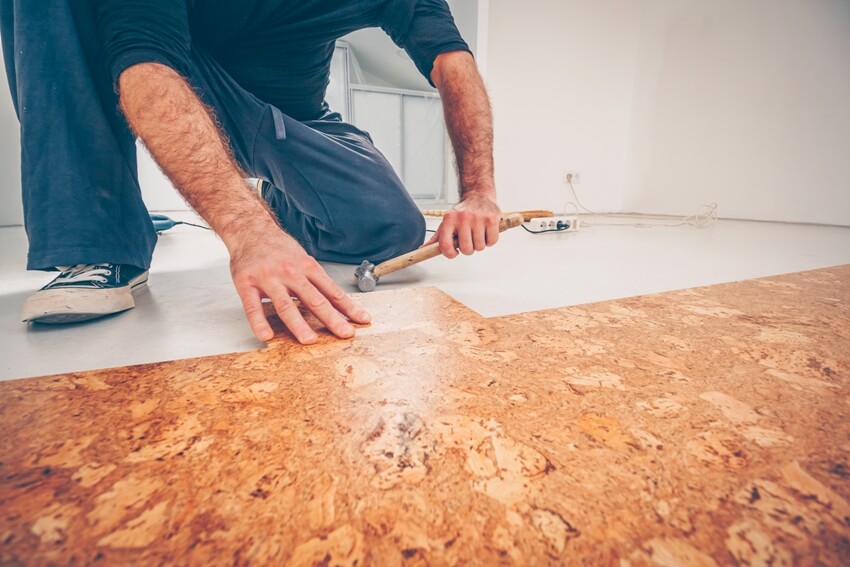
You need to get it varnished or sealed and resealed ever so often in order for it to get the protection it needs. Still, compared to the other flooring materials, they may require something a little bit more.
So the straight answer to this is that yes, they may require a little more amount of maintenance. They’re not like the typical floors that you can just sweep up and mop up and no one will be the wiser. They require special handling, special rugs, and annual resealing, even.
Here Are Some Final Points About Getting Cork Floors
They can swell especially if moisture is left unchecked so you need to look out for that. They may also not be so great for pet owners because pets tend to claw and scratch.
If you have a cat, for example, your cork floors can end up being a total nightmare to have to constantly look out for and maintain. But overall, given the right circumstances, cork floors are still viable flooring options to consider for as long as you know how to protect and maintain them.
Visit our guide to cork vs bamboo flooring for more related ideas and options.

